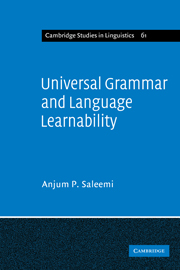Book contents
- Frontmatter
- Contents
- Preface
- 1 The problem of language learnability
- 2 The components of the linguistic system
- 3 The components of the learning system
- 4 Approaches to parameter fixation
- 5 The scope and limits of the current approaches
- 6 The distribution and variety of null subjects
- 7 Augmented parameter fixation: pro subjects and learnability
- 8 Review and integration
- Notes
- References
- Index
5 - The scope and limits of the current approaches
Published online by Cambridge University Press: 04 August 2010
- Frontmatter
- Contents
- Preface
- 1 The problem of language learnability
- 2 The components of the linguistic system
- 3 The components of the learning system
- 4 Approaches to parameter fixation
- 5 The scope and limits of the current approaches
- 6 The distribution and variety of null subjects
- 7 Augmented parameter fixation: pro subjects and learnability
- 8 Review and integration
- Notes
- References
- Index
Summary
Not surprisingly, several linguistic, learnability-theoretic and acquisitional questions issue from the set-theoretical approach of Wexler and Manzini and from Hyams's developmental approach. Some of these questions are identified, discussed and analysed in the following pages.
An examination of the formal approach
In some important respects the set-theoretical model of Wexler and Manzini appears to be a step in the right direction. Linguistically, the model has given the idea of a multi-valued parameter a concrete shape. It has also raised interesting questions regarding the way parameters could be related to each other, basically as to how independent the fixing of the one parameter is from that of another. However, one should remember that the set-theoretical approach, as it is presented by these authors, is perhaps more of a tour de force than an empirically viable theory; for one thing, it is deterministic in the sense that the environment's role is primarily one-way, i.e. that of providing input, and not backing it up by some form of monitoring of the knowledge acquired in the first instance; moreover, it is far too deterministic to be psychologically convincing and too conservative to be applicable to a wide range of parameters. As a result, it may be necessary to put some empirical flesh on the formal skeleton it furnishes.
- Type
- Chapter
- Information
- Universal Grammar and Language Learnability , pp. 76 - 89Publisher: Cambridge University PressPrint publication year: 1992



